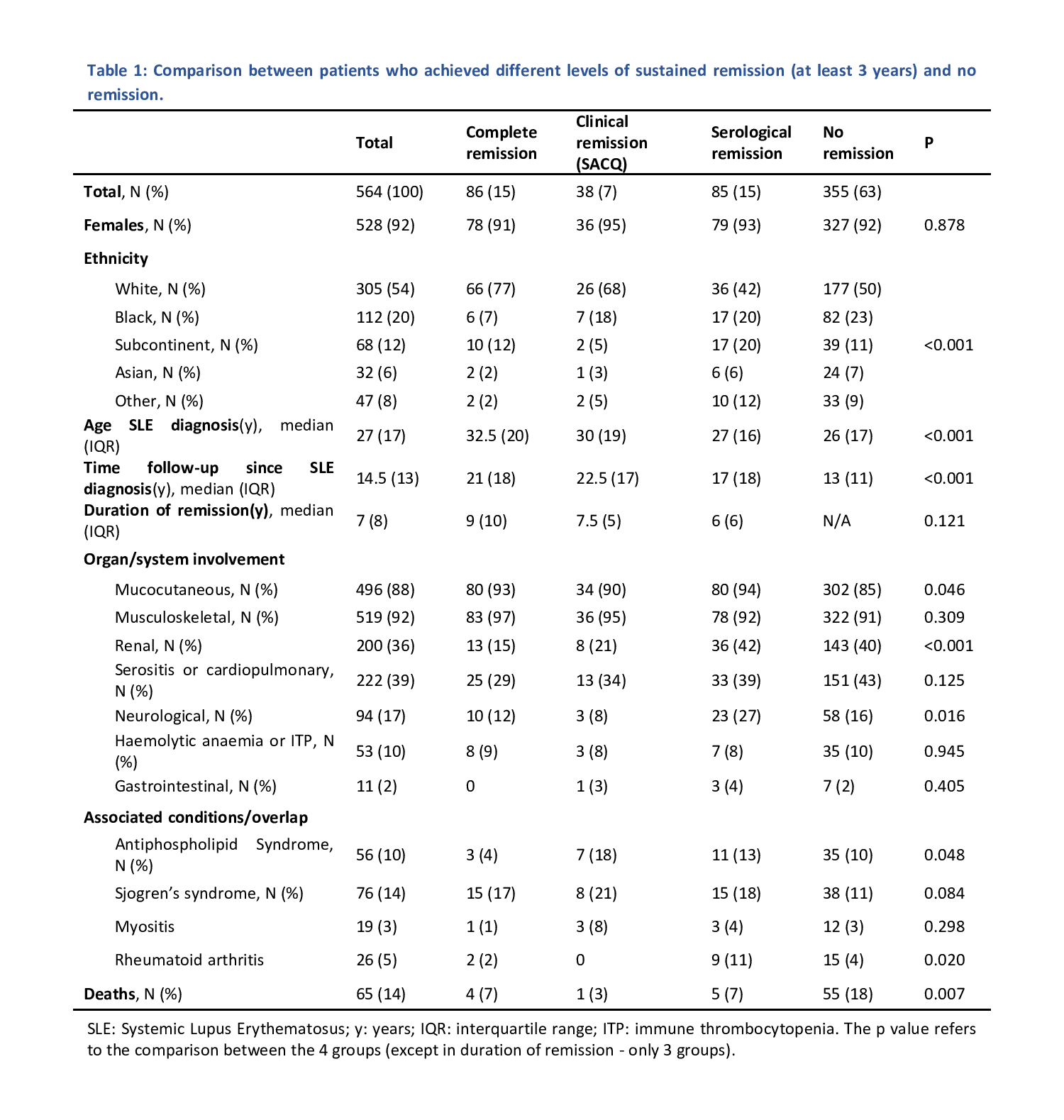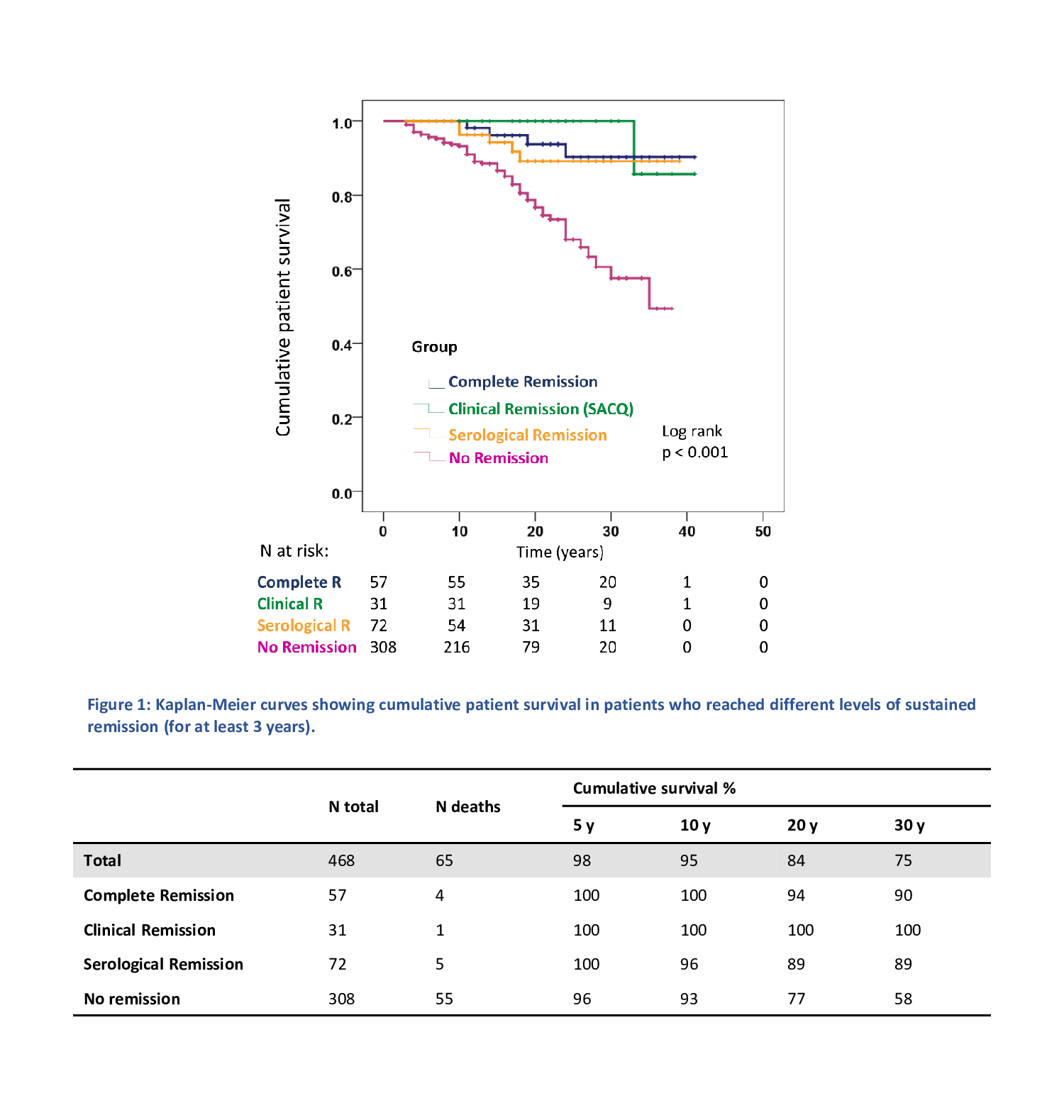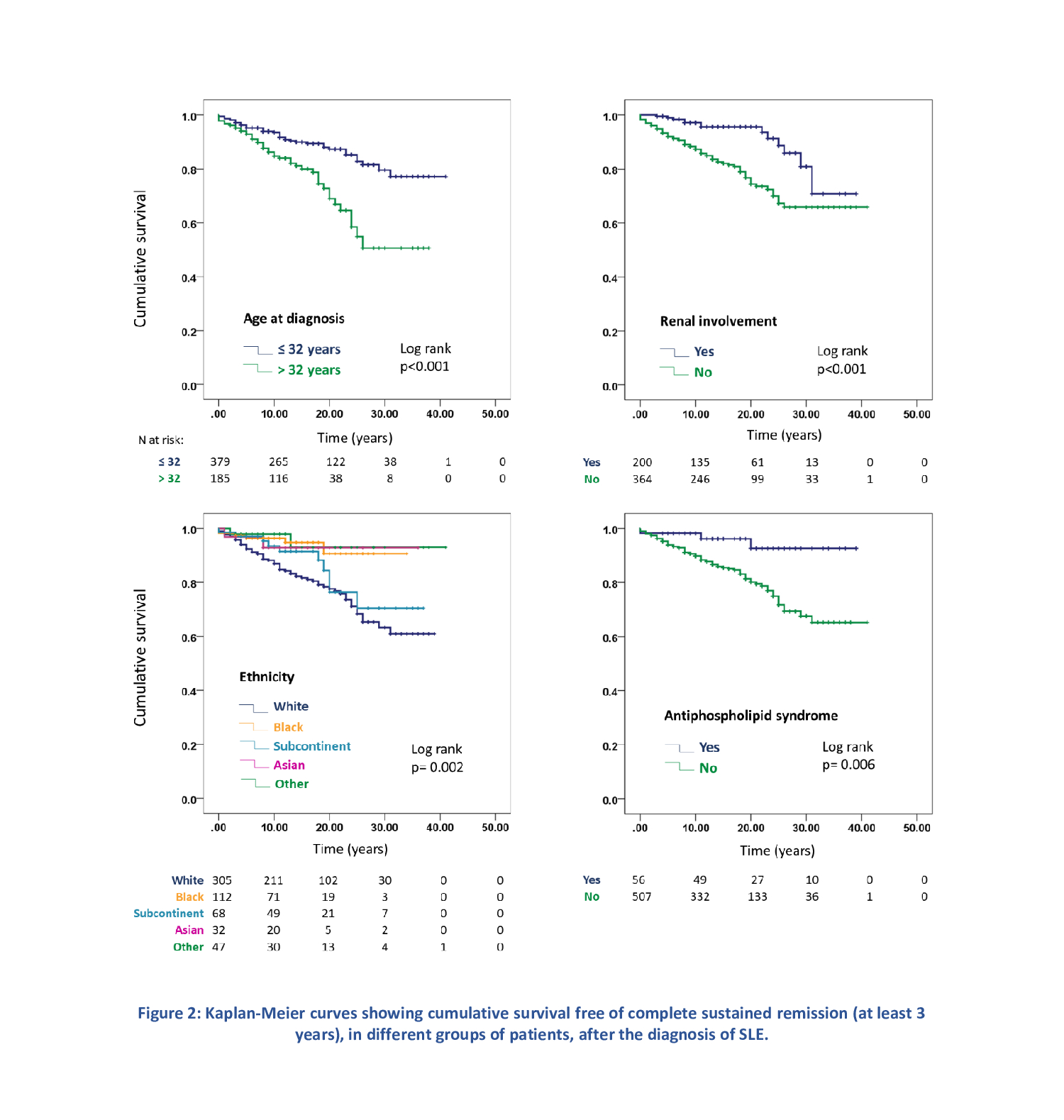Session Information
Date: Monday, November 8, 2021
Title: SLE – Diagnosis, Manifestations, & Outcomes Poster III: Outcomes (1257–1303)
Session Type: Poster Session C
Session Time: 8:30AM-10:30AM
Background/Purpose: Disease activity is a major determinant of mortality whereas prolonged remission contributes to improving health outcomes in SLE patients (pts). Remission is thus a key target, however, different definitions have been used.
Our aim was to investigate predictors of sustained complete remission for at least 3 and 5 years.
Methods: Retrospective observational study from Jan.1978-Dec.2019. Pts attending the Lupus Clinic in a tertiary care hospital for a period of at least three years. All pts fulfilled either the 1997 update of the 1982 American College of Rheumatology (ACR) revised criteria for classification of SLE or the 2019 EULAR/ACR criteria. To be included in the study, pts had to have been attending the clinic at least once a year. At each visit, disease activity was assessed using the BILAG index (also sensitive to detect flares) and blood test were done.
Complete remission (CR) was defined as no clinical activity (BILAG score C, D or E only), taking no steroids or immunosuppressants (antimalarials were permitted) and no serological activity (normal dsDNA antibodies and C3 levels) for a minimum of 3 consecutive years. Pts were serologically active clinically quiescent (SACQ) if there was no clinical activity, but an active serological profile (low C3 and/or high dsDNA) for at least 3 consecutive years; and in serological remission (SR) if there was no serological activity but persistent clinical activity (BILAG score A or B and/or treatment with steroids or immunosuppressive drugs) for at least 3 consecutive years. Pts not meeting the remission definitions were included in a no-remission group.
After testing for normality, we compared continuous numerical variables with Kruskal-Wallis test. For categorical variables, we compared groups using Pearson’s chi-squared test. Kaplan-Meier curves were used to investigate cumulative survival. Pts were censored if they were lost to follow-up or reached the end of the study. Cox regression analysis was performed to investigate predictors of sustained remission. For continuous numerical variables showing a significant result, we used ROC curves to find a cut-off for each variable. All variables with a significant result in univariable analysis were included in the multivariable model. Statistical significance for P value < 0.05.
Results: 564 pts included. 15% achieved CR; 7% SACQ; 15% SR. 63% attained no remission.
Pts who did not reach any kind of sustained remission died significantly earlier (p< 0.001). Cumulative survival figures at 5, 10, 20 and 30 years were 100, 100, 94 and 90%, respectively, for pts who achieved CR and 96, 93, 77 and 58%, respectively, for pts in the no-remission group.
Significant predictors of CR were white ethnicity, adjusted hazard ratio (HR) 2.16 [95% CI 1.30-3.59] p=0.003; older age at diagnosis ( >32-years), HR 1.92 [1.24-2.97] p=0.003; absence of renal involvement, HR 2.55 [1.39-4.67] p=0.002; and no concomitant antiphospholipid syndrome (APS), HR 4.92 [1.55-15.59] p=0.007.
Conclusion: Pts not achieving any kind of sustained remission have a higher risk of early mortality. White ethnicity, older age at diagnosis, absence of renal involvement and of APS were significantly associated with CR.
 Table 1: Comparison between patients who achieved different levels of sustained remission (at least 3 years) and no remission.
Table 1: Comparison between patients who achieved different levels of sustained remission (at least 3 years) and no remission.
 Figure 1: Kaplan-Meier curves showing cumulative patient survival in patients who reached different levels of sustained remission (for at least 3 years).
Figure 1: Kaplan-Meier curves showing cumulative patient survival in patients who reached different levels of sustained remission (for at least 3 years).
 Figure 2: Kaplan-Meier curves showing cumulative survival free of complete sustained remission (at least 3 years), in different groups of patients, after the diagnosis of SLE.
Figure 2: Kaplan-Meier curves showing cumulative survival free of complete sustained remission (at least 3 years), in different groups of patients, after the diagnosis of SLE.
To cite this abstract in AMA style:
Durao-Carvalho G, Fernandez R, Goulden B, Farinha F, Isenberg D. Major Determinants of Prolonged Remission in Systemic Lupus Erythematosus: Retrospective Study over a 41-Year Period [abstract]. Arthritis Rheumatol. 2021; 73 (suppl 9). https://acrabstracts.org/abstract/major-determinants-of-prolonged-remission-in-systemic-lupus-erythematosus-retrospective-study-over-a-41-year-period/. Accessed .« Back to ACR Convergence 2021
ACR Meeting Abstracts - https://acrabstracts.org/abstract/major-determinants-of-prolonged-remission-in-systemic-lupus-erythematosus-retrospective-study-over-a-41-year-period/
